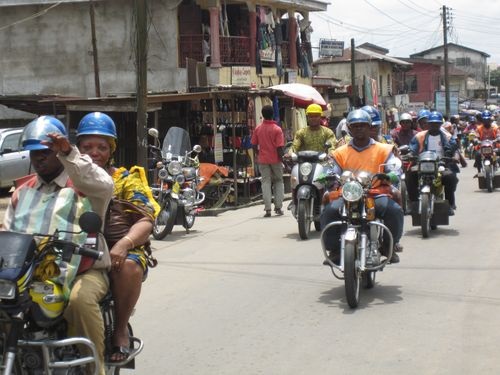
‘Okada menace’ conversation needs to be re-visited
Transportation remains a key driver of development, as it is the means by which people move from one place to another to carry out their economic activities.
From the era of travel on foot, through to the period when people used camels, donkeys and horses to the current dispensation of electric cars, the tube, aircraft, among others, statistics available suggest that in many developed countries, transportation accounts for between six and 12 per cent of GDPs.
In Ghana, transportation contributed about GHc2,036 million to GDP in the third quarter of 2019.
Alongside other means of transport in the country is the use of motorbikes, popularly known as ‘Okada’, which, until recently, were mainly used privately.
However, the use of motorbikes has gradually but intensely moved into the commercial arena.
And this is where the challenge is.
The Daily Graphic notes the many functions that motorbikes perform in our society.
First, they have come in readily to reduce the unemployment situation, with the commercial motorbikes engaging a sizeable number of the youth.
Furthermore, but for the motorbikes, people in some areas of the country that are inaccessible by road would have found it difficult to commute from their localities to others.
In some places, motorbikes are improvised vehicles for every activity, including being used as ambulances to convey the sick and women in labour to health centres.
Despite these good interventions by the ‘Okadas’, they have also come to represent all the bad things and indiscipline on our roads.
Their riders have become a law unto themselves.
They fail to stop when traffic lights signal red and do not respect or obey any traffic regulation.
Again, they speed past when pedestrians have the right to cross the road.
The riders even face oncoming vehicles, by which act they have knocked down and killed many breadwinners, with the lucky victims being maimed for life.
Sadly, the police seem helpless, as they look on while the riders break road traffic regulations with impunity. Indeed, the ‘Okadas’ have become such a nuisance because of how they operate in the cities.
Interestingly, although the riders also constitute a fair share of the casualties resulting from their recklessness, they care less about their safety.
But figures released by the Accident, Emergency and Orthopaedic Department of the Korle Bu Teaching Hospital early this year are harrowing. ‘Okada’ accidents topped road accident cases during the Christmas and the New Year period.
In just two days, December 22 and 23, Korle Bu admitted 30 road accident cases, out of which as many as 20 were ‘Okada’ cases.
It is horrifying to learn that for last year, 732 people died through ‘Okada’ accidents.
The Ghana Medical Association (GMA) is obviously terrified by the casualty figures and has called for a ban on ‘Okada’ operations in the country until such time that policies are put in place to regulate their use, especially for commercial purposes, to save lives.
The National Road Safety Authority (NRSA) has also made a similar case, calling for a policy direction on the use of motorbikes and tricycles for commerce in the country.
We note the realisation that ‘Okada’ has come to stay, but think we cannot allow the riders to continue in their carelessness and disregard for traffic rules and regulations to continue to put the lives of citizens in danger.
The Daily Graphic thus strongly adds its voice to those already expressed by others and demand that the use of motorbikes for commercial purposes be regulated, and immediately too.
It is an irony that neighbouring countries and other jurisdictions around the world have more motorbikes than there are in Ghana, but the riders in those countries obey the rules.
The situation becomes dire when viewed against the background that most of the victims of ‘Okada’ accidents are said to be in their youth, who are the hope of the country’s future.
Certainly, we cannot continue to lose our most cherished resource, the people, through means over which we have control.
The authorities must act, and it must be now, not later.
